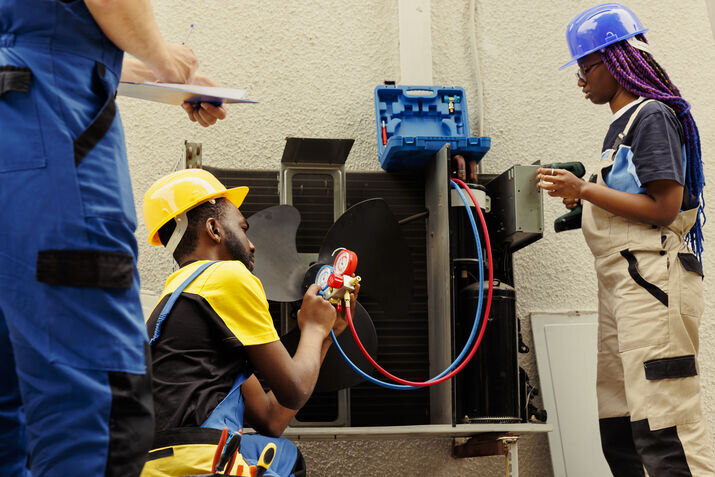Annual HVAC Maintenance: Complete Guide for Optimal Performance
Annual HVAC maintenance is the cornerstone of keeping your heating and cooling system running efficiently throughout the year. Regular maintenance not only extends your system’s lifespan but also reduces energy consumption, prevents costly repairs, and ensures optimal indoor comfort. Professional annual HVAC maintenance services can save homeowners thousands of dollars while maintaining peak system performance.
Your HVAC system works tirelessly year-round, and without proper care, even the most reliable units can experience decreased efficiency and unexpected breakdowns. This comprehensive guide will walk you through everything you need to know about annual HVAC maintenance, from essential tasks to professional services that keep your system running smoothly.
Why Annual HVAC Maintenance is Critical for Your Home
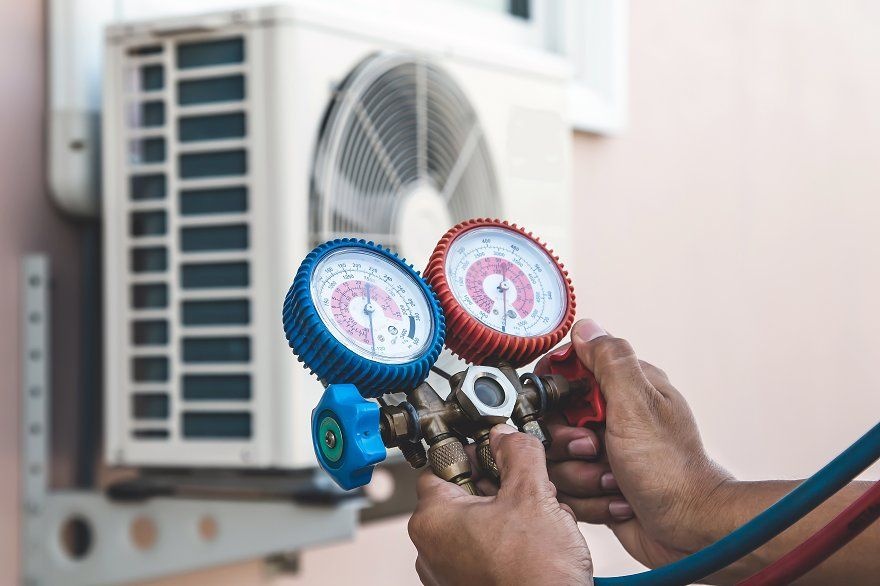
Annual HVAC maintenance acts like preventative medicine for your heating and cooling system, ensuring it runs efficiently and reduces energy bills. Just as you wouldn’t skip your car’s tune-up, your HVAC system needs regular check-ups to extend its lifespan and avoid costly repairs.
During professional service, technicians inspect electrical connections, refrigerant levels, and clean condenser coils to keep your system running smoothly. They also replace air filters and clean components, improving indoor air quality by reducing allergens and dust for a healthier home environment.
Spring & Fall HVAC Checkups
Spring and fall represent the ideal times for comprehensive HVAC maintenance. These seasonal transitions allow technicians to prepare your system for the demanding summer cooling and winter heating seasons. Key points of seasonal maintenance include:
- Spring maintenance focuses on preparing the air conditioner for summer
- Fall maintenance emphasizes heating system readiness
- Technicians perform thorough inspections of all moving parts, ensuring proper lubrication
- Identification of worn components that may need replacement
- Testing system startup and shutdown procedures
- Calibrating thermostats for accurate temperature control
- Checking electrical connections for safety and efficiency
- Verifying proper refrigerant levels in cooling systems
- Cleaning outdoor unit components
- Testing safety controls and emergency shutoffs for safe operation during peak usage
- Examining ductwork for leaks or damage caused by seasonal changes
- Preventing system breakdowns during critical heating and cooling periods
Air Filter Replacement and Cleaning Services
Air filters represent one of the most crucial components requiring regular attention during annual HVAC maintenance. Dirty filters restrict airflow, forcing your system to work harder and consume more energy. Professional maintenance services include filter inspection, cleaning, or replacement based on filter type and condition.
| Filter Type | Replacement Frequency | Annual HVAC Maintenance Benefits |
| Basic Fiberglass | Every 30 days | Maintains basic proper airflow |
| Pleated Filters | Every 90 days | Improves air quality and system efficiency |
| HEPA Filters | Every 6-12 months | Maximum filtration for indoor air quality |
| Washable Filters | Clean monthly | Cost-effective maintenance solution |
High-quality air filters improve system efficiency and indoor air quality simultaneously, meeting indoor air quality standards that protect your family’s health. During annual maintenance, technicians recommend appropriate filter types based on your specific HVAC system requirements and household needs. They consider factors like household size, pet ownership, and allergy concerns when suggesting optimal filtration solutions.
Condenser and Evaporator Coil Maintenance
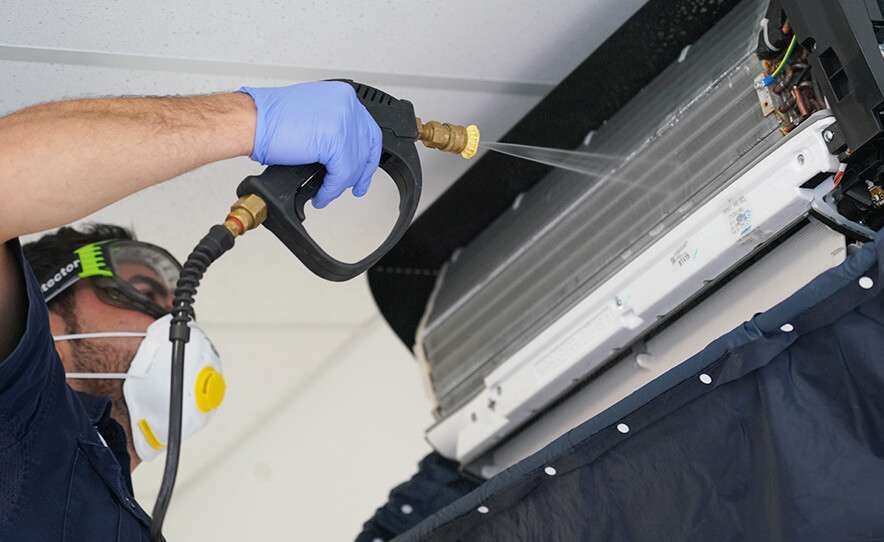
Condenser coils and evaporator components require professional cleaning and inspection during annual HVAC maintenance. Dirty coils reduce heat transfer efficiency, forcing your system to work harder and consume more energy. Technicians clean the coils, straighten bent fins to improve airflow, and check drainage and refrigerant flow to ensure optimal operation.
They also remove debris around the outdoor unit and apply protective coatings when needed to extend coil lifespan. This thorough maintenance ensures your air conditioning system operates efficiently and maintains proper cooling capacity during the demanding summer months.
Professional Annual HVAC Maintenance and System Inspections
Professional annual HVAC maintenance includes comprehensive inspections of your heating and cooling equipment to ensure optimal performance and safety. Key tasks performed by technicians include:
- Inspecting and tightening electrical connections to prevent hazards and system failures
- Testing safety controls and calibrating thermostats for accurate temperature regulation
- Verifying proper refrigerant levels and detecting leaks in air conditioner and heat pump systems
- Examining ductwork for leaks or damage that affects system efficiency and indoor comfort
- Conducting system cycling tests and performance measurements to maintain efficient operation
This thorough approach follows industry maintenance standards and helps keep your HVAC system running safely and efficiently while identifying potential issues before they lead to costly repairs.
Preventive Maintenance Contracts and Benefits
Preventive maintenance contracts provide peace of mind and cost savings for homeowners committed to regular HVAC maintenance. These agreements typically include annual or bi-annual service visits, priority scheduling, and discounts on repairs and replacement parts.
Preventative maintenance contracts ensure your annual HVAC service never gets overlooked, maintaining warranty coverage and system efficiency. Many contracts include emergency service provisions and extended warranties on labor and parts, providing comprehensive protection for your heating and cooling investment.
Seasonal HVAC Maintenance Requirements
Seasonal HVAC maintenance is essential to prepare your system for the changing demands of each season. By addressing specific needs in spring and fall, you can ensure your heating and cooling equipment operates efficiently and reliably year-round. Proper seasonal care helps prevent unexpected breakdowns and extends the lifespan of your HVAC system.
Spring HVAC Preparation and Air Conditioning Readiness
Spring HVAC maintenance prepares your air conditioning system for summer’s demanding cooling requirements. Professional technicians inspect outdoor unit components, clean condenser coils, and verify proper refrigerant levels essential for efficient cooling operation.
Spring maintenance includes testing air conditioner startup procedures and cooling capacity to ensure your system can handle summer heat loads. Technicians clean and inspect the outdoor unit for winter damage, removing debris and checking for component wear. The comprehensive service also includes testing thermostat cooling functions and calibration, replacing air filters with appropriate seasonal types, and examining electrical connections and safety controls.
Fall Heating System Maintenance and Winter Preparation
Fall annual HVAC maintenance shifts focus to heating system components, ensuring your furnace or heat pump operates safely and efficiently during the winter months. Professional technicians inspect heat exchangers, test safety controls, and verify proper gas connections in gas-powered equipment.
Heating maintenance also includes cleaning burner assemblies, inspecting venting systems, and testing carbon monoxide detectors. This thorough approach ensures safe, efficient heating operation while preventing dangerous carbon monoxide exposure and system failures during cold weather.
Energy Efficiency and Cost Benefits of Annual Maintenance
Maintaining your HVAC system annually not only ensures it runs efficiently but also brings significant cost savings. The following sections explore how regular maintenance reduces energy bills, extends equipment lifespan, and prevents costly repairs, maximizing your investment in home comfort.
Reducing Energy Bills Through Regular Maintenance
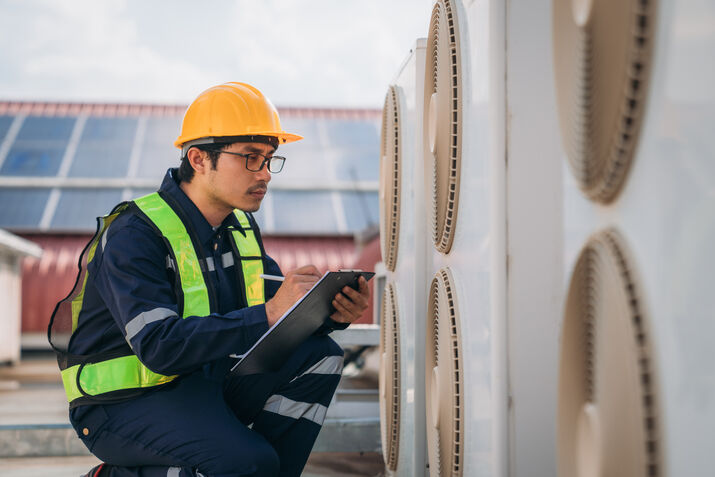
Regular maintenance significantly impacts your energy bills by maintaining optimal system efficiency. Well-maintained HVAC equipment operates more efficiently, requiring less energy to achieve desired indoor temperatures. According to energy efficiency recommendations from the Department of Energy, professional annual maintenance can reduce energy consumption by 15-20% compared to neglected systems.
Clean air filters improve airflow and reduce fan energy consumption, while properly calibrated thermostats prevent energy waste from overshooting temperatures. Well-lubricated moving parts reduce motor strain and electrical consumption, and clean condenser coils improve heat transfer and cooling efficiency.
Extending Equipment Lifespan and Performance
Annual maintenance significantly extends your HVAC system’s lifespan by addressing wear issues before they cause major component failures. Regular service keeps your system running smoothly and reduces stress on expensive components like compressors and heat exchangers.
Professional maintenance can extend equipment life by 5-10 years beyond typical replacement schedules, as confirmed by equipment longevity studies. This extension represents thousands of dollars in avoided replacement costs while maintaining reliable comfort and system efficiency throughout your equipment’s extended lifespan.
Preventing Major Problems and Costly Repairs
Preventive maintenance identifies minor issues before they escalate into major problems requiring expensive repairs. Professional technicians spot worn components, loose electrical connections, and developing system inefficiencies during routine check-ups.
Preventive maintenance helps avoid:
- Compressor failure from refrigerant leaks or electrical issues
- Heat exchanger cracks that could cause dangerous carbon monoxide leaks
- Blower motor failure from dirty filters and restricted airflow
- Electrical connection problems that could cause fires or system damage
- Condensate drain blockages leading to water damage
Early problem identification through annual HVAC maintenance prevents catastrophic failures that could leave you without heating or cooling during extreme weather.
DIY Maintenance vs Professional HVAC Service
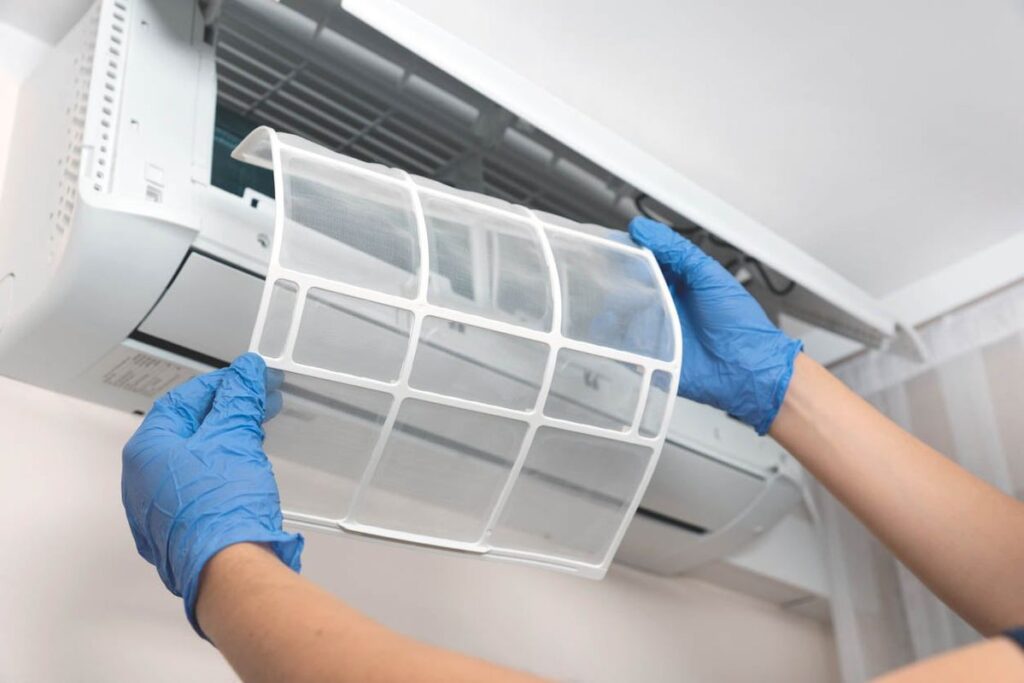
Homeowners can perform certain basic maintenance tasks between professional service visits. Air filter replacement is the most important DIY task, typically required every 1-3 months, depending on the filter type and household conditions.
Safe DIY Tasks:
- Air filter replacement and cleaning
- Outdoor unit debris removal and clearance
- Thermostat battery replacement
- Visual ductwork inspection for obvious damage
- Register and vent cleaning
When Professional Service is Essential
Professional annual HVAC maintenance is essential for tasks involving refrigerant, electrical connections, and gas components. Licensed technicians have the training, tools, and experience necessary to service these complex system elements safely while maintaining warranty coverage.
Common HVAC Issues Prevented by Annual Maintenance
| Issue | Cause | Impact | Professional Maintenance Solution |
| Poor system efficiency | Neglected annual HVAC maintenance | Higher energy consumption, reduced comfort | Comprehensive cleaning, calibration, and component inspection |
| Dirty air filters | Lack of regular replacement or cleaning | Restricted airflow, increased energy use | Filter inspection, cleaning, or replacement |
| Clogged condenser coils | Dirt and debris buildup | Reduced heat transfer efficiency | Coil cleaning and fin straightening |
| Improperly calibrated thermostats | Inaccurate settings or sensor issues | Inefficient system operation | Thermostat calibration and programming |
Choosing the Right HVAC Maintenance Provider
Selecting qualified professionals for annual HVAC maintenance involves evaluating credentials, experience, and service offerings. Licensed and insured technicians with manufacturer certifications and certified HVAC technicians’ credentials ensure comprehensive system care and warranty compliance.
Look for companies offering comprehensive AC maintenance and residential HVAC services with proven track records in your area. Companies that also provide commercial HVAC service often have more extensive experience and resources for complex system issues.
Reducing Carbon Footprint Through Efficiency

Regular maintenance significantly reduces your HVAC system’s environmental impact through improved efficiency and reduced energy consumption. Well-maintained systems require less electricity and fuel to achieve desired comfort levels, directly reducing greenhouse gas emissions.
Environmental Impact Reduction:
- 15-20% reduction in energy consumption through regular maintenance
- An extended equipment lifespan reduces manufacturing demand
- Proper refrigerant handling prevents ozone depletion
- Reduced landfill waste from premature equipment replacement
- Lower carbon emissions from improved system efficiency
Conclusion
Annual HVAC maintenance represents one of the most important investments homeowners can make in their comfort, safety, and financial well-being. Regular professional service ensures optimal system efficiency, prevents costly repairs, and extends equipment lifespan while maintaining consistent indoor comfort throughout the year.
Don’t wait for system problems to disrupt your comfort and budget. Contact us today to schedule your annual HVAC maintenance service and experience the peace of mind that comes with professional system care. Our experienced technicians at Callidus Air provide comprehensive maintenance services that keep your system running efficiently year-round.
Frequently Asked Questions About Annual HVAC Maintenance
To help you better understand the importance and details of annual HVAC maintenance, here are answers to some of the most common questions homeowners ask. This section covers scheduling, costs, DIY possibilities, and the consequences of neglecting maintenance.
How often should I schedule annual HVAC maintenance?
Most HVAC systems benefit from bi-annual maintenance – spring service for cooling preparation and fall service for heating readiness. Professional technicians can recommend optimal service intervals for your specific system and circumstances.
What’s included in a typical annual HVAC maintenance service?
Comprehensive annual HVAC maintenance includes air filter replacement, condenser coils cleaning, electrical connections inspection, refrigerant level verification, thermostat calibration, and safety control testing.
Can I perform annual HVAC maintenance myself?
While homeowners can handle basic tasks like air filter replacement and outdoor unit cleaning, most annual maintenance requires professional expertise for safe, effective completion while maintaining warranty coverage.
How much does annual HVAC maintenance typically cost?
Annual HVAC maintenance costs typically range from $100-300 per visit. The investment typically pays for itself through improved efficiency and avoided repair costs.
What happens if I skip annual HVAC maintenance?
Neglecting annual maintenance leads to reduced system efficiency, higher energy bills, more frequent repairs, and shortened equipment lifespan.

